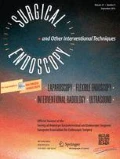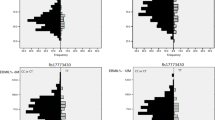Abstract
Purpose
Remarkable differences in weight loss have been observed in obese patients undergoing laparoscopic sleeve gastrectomy (LSG). These high variations might be partly explained by genetic factors. The rs9939609 fat mass and obesity-associated gene (FTO) polymorphism has been implicated in the susceptibility of obesity. We aimed to explore the effects of the rs9939609 FTO gene polymorphism on weight loss among severely obese patients applying for LSG.
Materials and methods
All individuals were analyzed for the FTO rs9939609 gene polymorphism. A total of 74 morbid obese patients (20 male, 54 female) were operated. Body weight and body mass index (BMI) were measured at before LSG and after surgery at the sixth month.
Results
Twenty-eight patients (37.8 %) had genotype TT (wild-type allel), 36 patients (48.6 %) had genotype TA, and 10 patients (13.5 %) had genotype AA. In both wild-type group and mutant group, BMI and weight levels decreased at the sixth month after surgery. Percent of excess weight loss (EWL) at 6 months of follow-up was similar in both groups. There were no differences between the mutant and wild-type groups percent of EWL at the sixth month after applying LSG.
Conclusion
Our data showed that the rs9939609 FTO gene polymorphism is not a useful genetic test prior to LSG to help clinicians predicting the weight loss for severely obese patients in short-term follow-up.
Similar content being viewed by others
References
Marti A, Moreno-Aliaga MJ, Hebebrand J, Martínez JA (2004) Genes, lifestyles and obesity. Int J Obes Relat Metab Disord 28(Suppl 3):S29–S36
Scuteri A, Sanna S, Chen WM, Uda M, Albai G, Strait J, Najjar S, Nagaraja R, Orrú M, Usala G, Dei M, Lai S, Maschio A, Busonero F, Mulas A, Ehret GB, Fink AA, Weder AB, Cooper RS, Galan P, Chakravarti A, Schlessinger D, Cao A, Lakatta E, Abecasis GR (2007) Genome-wide association scan shows genetic variants in the FTO gene are associated with obesity-related traits. PLoS Genet 3(7):e115
Ichihara S, Yamada Y (2008) Genetic factors for human obesity. Cell Mol Life Sci 65(7–8):1086–1098
Alfredo Martínez J, Enríquez L, Moreno-Aliaga MJ, Martí A (2007) Genetics of obesity. Public Health Nutr 10(10A):1138–1144. Review. Erratum in: Public Health Nutr. 2009 Jan;12(1):136. Martínez-Hernández, Alfredo [corrected to Alfredo Martínez, J]; Moreno-Moreno, María Jesús [corrected to Moreno-Aliaga, María Jesús]
Rolls ET (2007) Understanding the mechanisms of food intake and obesity. Obes Rev 8(Suppl 1):67–72
Walley AJ, Asher JE, Froguel P (2009) The genetic contribution to non-syndromic human obesity. Nat Rev Genet 10(7):431–442. doi:10.1038/nrg2594
Hinney A, Nguyen TT, Scherag A, Friedel S, Brönner G, Müller TD, Grallert H, Illig T, Wichmann HE, Rief W, Schäfer H, Hebebrand J (2007) Genome wide association (GWA) study for early onset extreme obesity supports the role of fat mass and obesity associated gene (FTO) variants. PLoS One 2(12):e1361
Grimm ER, Steinle NI (2011) Genetics of eating behavior: established and emerging concepts. Nutr Rev 69(1):52–60. doi:10.1111/j.1753-4887.2010.00361.x
Tung YC, Ayuso E, Shan X, Bosch F, O’Rahilly S, Coll AP, Yeo GS (2010) Hypothalamic-specific manipulation of Fto, the ortholog of the human obesity gene FTO, affects food intake in rats. PLoS One 5(1):e8771. doi:10.1371/journal.pone.0008771
Rendo T, Moleres A, Marti Del Moral A (2009) Effects of the FTO gene on lifestyle intervention studies in children. Obes Facts 2(6):393–399. doi:10.1159/000262296
Gerken T, Girard CA, Tung YC, Webby CJ, Saudek V, Hewitson KS, Yeo GS, McDonough MA, Cunliffe S, McNeill LA, Galvanovskis J, Rorsman P, Robins P, Prieur X, Coll AP, Ma M, Jovanovic Z, Farooqi IS, Sedgwick B, Barroso I, Lindahl T, Ponting CP, Ashcroft FM, O’Rahilly S, Schofield CJ (2007) The obesity-associated FTO gene encodes a 2-oxoglutarate-dependent nucleic acid demethylase. Science 318(5855):1469–1472
Fernández AM, Kim JK, Yakar S, Dupont J, Hernandez-Sanchez C, Castle AL, Filmore J, Shulman GI, Le Roith D (2001) Functional inactivation of the IGF-I and insulin receptors in skeletal muscle causes type 2 diabetes. Genes Dev 15(15):1926–1934
Dougkas A, Yaqoob P, Givens DI, Reynolds CK, Minihane AM (2013) The impact of obesity-related SNP on appetite and energy intake. Br J Nutr 110(6):1151–1156. doi:10.1017/S0007114513000147
Frayling TM, Timpson NJ, Weedon MN, Zeggini E, Freathy RM, Lindgren CM, Perry JR, Elliott KS, Lango H, Rayner NW, Shields B, Harries LW, Barrett JC, Ellard S, Groves CJ, Knight B, Patch AM, Ness AR, Ebrahim S, Lawlor DA, Ring SM, Ben-Shlomo Y, Jarvelin MR, Sovio U, Bennett AJ, Melzer D, Ferrucci L, Loos RJ, Barroso I, Wareham NJ, Karpe F, Owen KR, Cardon LR, Walker M, Hitman GA, Palmer CN, Doney AS, Morris AD, Smith GD, Hattersley AT, McCarthy MI (2007) A common variant in the FTO gene is associated with body mass index and predisposes to childhood and adult obesity. Science 316(5826):889–894
Loos RJ, Bouchard C (2008) FTO: the first gene contributing to common forms of human obesity. Obes Rev 9(3):246–250. doi:10.1111/j.1467-789X.2008.00481.x
Kashyap SR, Gatmaitan P, Brethauer S, Schauer P (2010) Bariatric surgery for type 2 diabetes: weighing the impact for obese patients. Cleve Clin J Med 77(7):468–476. doi:10.3949/ccjm.77a.09135
Jaunoo SS, Southall PJ (2010) Bariatric surgery. Int J Surg 8(2):86–89. doi:10.1016/j.ijsu.2009.12.003
Lalor PF, Tucker ON, Szomstein S, Rosenthal RJ (2008) Complications after laparoscopic sleeve gastrectomy. Surg Obes Relat Dis 4(1):33–38
Brethauer SA, Hammel JP, Schauer PR (2009) Systematic review of sleeve gastrectomy as staging and primary bariatric procedure. Surg Obes Relat Dis 5(4):469–475. doi:10.1016/j.soard.2009.05.011
Clifton P (2010) Diabetes: treatment of type 2 diabetes mellitus with bariatric surgery. Nat Rev Endocrinol 6(4):191–193. doi:10.1038/nrendo.2010.23
Taşan E (2005) Identification, evaluation and epidemiology of obesity. Turkiye Klinikleri J Int Med Sci 1(37):1–4
Reinehr T, Hinney A, Toschke AM, Hebebrand J (2009) Aggravating effect of INSIG2 and FTO on overweight reduction in a one-year lifestyle intervention. Arch Dis Child 94(12):965–967. doi:10.1136/adc.2008.147652
Razquin C, Martinez JA, Martinez-Gonzalez MA, Bes-Rastrollo M, Fernández-Crehuet J, Marti A (2010) A 3-year intervention with a Mediterranean diet modified the association between the rs9939609 gene variant in FTO and body weight changes. Int J Obes (Lond) 34(2):266–272. doi:10.1038/ijo.2009.233
Liou TH, Chen HH, Wang W, Wu SF, Lee YC, Yang WS, Lee WJ (2011) ESR1, FTO, and UCP2 genes interact with bariatric surgery affecting weight loss and glycemic control in severely obese patients. Obes Surg 21(11):1758–1765. doi:10.1007/s11695-011-0457-3. Erratum in: Obes Surg. 2012 Jan;22(1):194
de Luis DA, Aller R, Conde R, Izaola O, Pacheco D, Sagrado MG, Primo D (2012) Effects of RS9939609 gene variant in FTO gene on weight loss and cardiovascular risk factors after biliopancreatic diversion surgery. J Gastrointest Surg 16(6):1194–1198. doi:10.1007/s11605-012-1829-2
Fredriksson R, Hägglund M, Olszewski PK, Stephansson O, Jacobsson JA, Olszewska AM, Levine AS, Lindblom J, Schiöth HB (2008) The obesity gene, FTO, is of ancient origin, up-regulated during food deprivation and expressed in neurons of feeding-related nuclei of the brain. Endocrinology 149(5):2062–2071. doi:10.1210/en.2007-1457
Dina C, Meyre D, Gallina S, Durand E, Körner A, Jacobson P, Carlsson LM, Kiess W, Vatin V, Lecoeur C, Delplanque J, Vaillant E, Pattou F, Ruiz J, Weill J, Levy-Marchal C, Horber F, Potoczna N, Hercberg S, Le Stunff C, Bougnères P, Kovacs P, Marre M, Balkau B, Cauchi S, Chèvre JC, Froguel P (2007) Variation in FTO contributes to childhood obesity and severe adult obesity. Nat Genet 39(6):724–726
Stratigopoulos G, Padilla SL, LeDuc CA, Watson E, Hattersley AT, McCarthy MI, Zeltser LM, Chung WK, Leibel RL (2008) Regulation of Fto/Ftm gene expression in mice and humans. Am J Physiol Regul Integr Comp Physiol 294(4):R1185–R1196. doi:10.1152/ajpregu.00839.2007. Epub 2008 Feb 6. Erratum in: Am J Physiol Regul Integr Comp Physiol. 2008 Oct;295(4):R1360-3
Wåhlén K, Sjölin E, Hoffstedt J (2008) The common rs9939609 gene variant of the fat mass- and obesity-associated gene FTO is related to fat cell lipolysis. J Lipid Res 49(3):607–611
Ren CJ, Patterson E, Gagner M (2000) Early results of laparoscopic biliopancreatic diversion with duodenal switch: a case series of 40 consecutive patients. Obes Surg 10(6):514–523 discussion 524
Dogan M, Tugmen C, Kebapci E, Karaman K, Ozturk S, Olmez M, Karaca C, Bademkiran E, Gorgun M, Aydin C (2013) Effective weight control and normalization of metabolic parameters after laparoscopic sleeve gastrectomy: a single center experience. Hepatogastroenterology 60(122):368–371
Acknowledgments
This work was supported by Antalya Education and Research Hospital (Grant Number: 81266704).
Disclosures
Özgür Balasar, Tuğrul Çakır, Özgür Erkal, Arif Aslaner, Bülent Çekiç, Mehmet Uyar, Nurullah Bülbüller and Mehmet Tahir Oruç declare that they have no conflict of interest in relation to this work.
Author information
Authors and Affiliations
Corresponding author
Rights and permissions
About this article
Cite this article
Balasar, Ö., Çakır, T., Erkal, Ö. et al. The effect of rs9939609 FTO gene polymorphism on weight loss after laparoscopic sleeve gastrectomy. Surg Endosc 30, 121–125 (2016). https://doi.org/10.1007/s00464-015-4169-y
Received:
Accepted:
Published:
Issue Date:
DOI: https://doi.org/10.1007/s00464-015-4169-y




